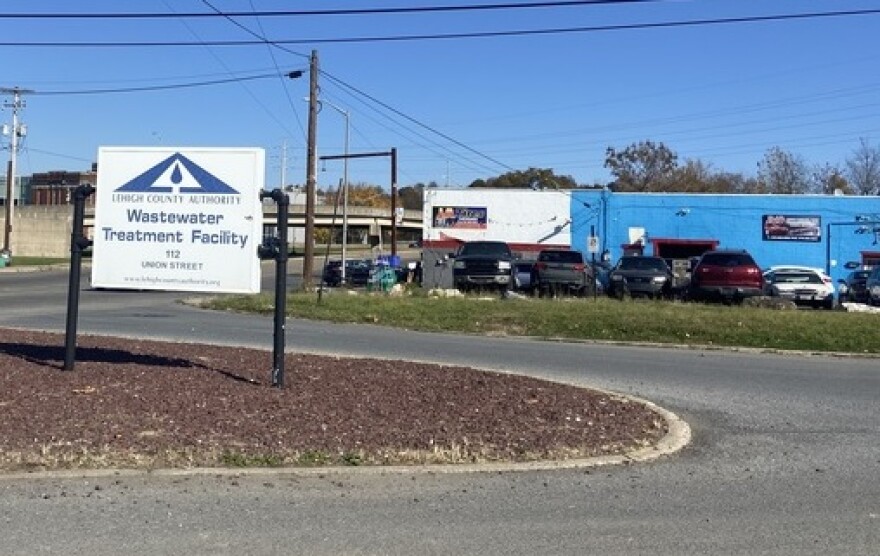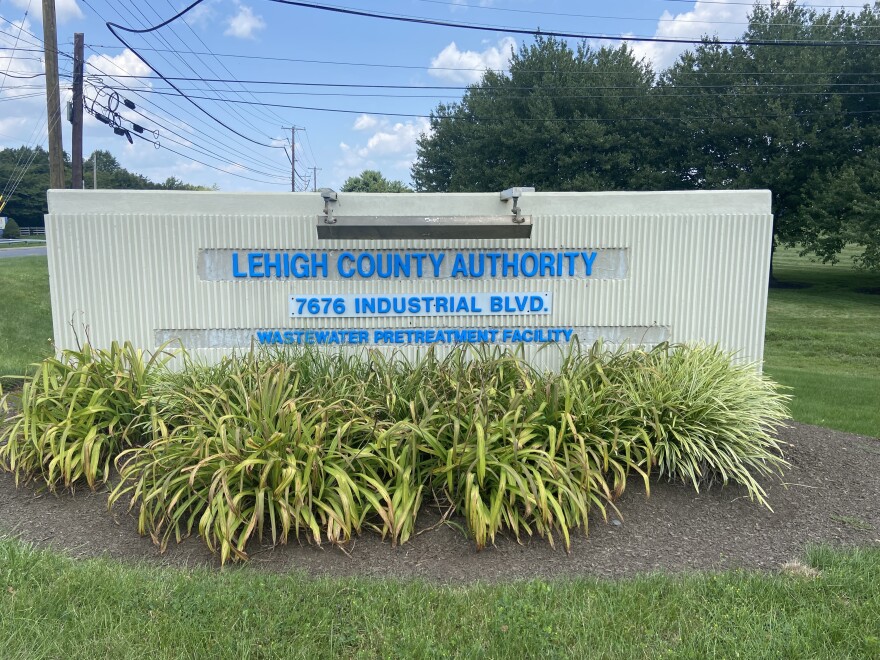UPPER MACUNGIE TWP., Pa. — Almost half a century ago, Lehigh County officials decided to invest in a regional industrial pretreatment plant, hoping to incentivize food and beverage manufacturers to move in.
It worked.
“It's a very specialized facility with some specialized technology in place to handle that type of high-strength waste, and it's, for the most part, at the end of its useful life,” said Liesel M. Gross, CEO of the Lehigh County Authority. “The other challenge that we're facing, with this facility, is that we're at capacity in terms of that high-strength waste, so industrial growth is limited based on what we can allow to come into the facility.
“Or, new industry would have to treat on-site, like what happens everywhere else.”
More than eight months after announcing a $600 million price tag over the next decade to upgrade aging water and wastewater treatment infrastructure, increase capacity and solve other issues in more than a dozen Lehigh County municipalities, officials are still working out the details.
With almost half the estimated cost — $267 million — earmarked for the projects at the pretreatment plant at 7676 Industrial Road, stakeholders including municipal officials and industry leaders have been drafted to consider the most prudent way forward. While the bulk of the pretreatment plant’s capacity is used for industries, there’s also a residential component and hauling services, with trucks dropping waste at the facility.
With the plan for a total overhaul of the plant struck down, two other options remain, costing an estimated $93 million and $32 million, respectively.
“When we received that figure from the engineers maybe a year and a half ago, we really thought, ‘Wow, that's a lot,’ and ‘How do we pay for that when we have a limited customer base?’” Gross said. “And furthermore, if we were to invest in this facility to expand the capacity, do we have reasonable assurance that there will be new industrial growth to pay for it?
"We're the utility, and that's not to diminish our role, because utility and the infrastructure is important, but those kinds of economic development and land use planning type decisions are made by lots of regional agencies and municipalities in collaboration.”Liesel M. Gross, CEO of Lehigh County Authority
“That's a decision that Lehigh County Authority can't make on its own. We're the utility, and that's not to diminish our role, because utility and the infrastructure is important, but those kinds of economic development and land use planning type decisions are made by lots of regional agencies and municipalities in collaboration.”
The cost of upgrades at the pretreatment plant will depend, in part, on whether the five major users continue to rely on it, or build and pay for their own facilities.
LehighValleyNews.com reached out to all five companies identified as key stakeholders by the LCA of the pretreatment facility: Keurig Dr Pepper, SunOpta, Coca-Cola, Ocean Spray and Boston Beer. None responded to a request for comment.
‘A difficult decision’
Recent stakeholder meetings have shown the decision of how to proceed with the pretreatment plant comes down to capacity versus the opportunity for growth, Gross said.
“If we build an expanded capacity, will we actually be able to use it and get a return on that investment as a region?” Gross asked. “I think the panel group fed back to us that they're not sure — they're really not sure.”
The area around the plant is built out, with little available land left. It’s hard for officials to predict what industries might move in, if any, and what their needs will be.
“It’s a difficult decision, but the economic benefit of having these industries here is significant,” she said. “It's important to our region, so we want to make the right decision.”
The pretreatment plant supports 22 businesses across 11 industries, according to data provided by the LCA. Those businesses employ just shy of 3,000 people and generate $250 million in annual earnings.
The authority has received feedback from Keurig Dr Pepper, SunOpta, Coca-Cola, Ocean Spray and Boston Beer.
“Some of them are thinking maybe they should treat on-site instead of being part of this project, especially if it's going to cost a lot of money."Liesel M. Gross, CEO of Lehigh County Authority
“Some of them are thinking maybe they should treat on-site instead of being part of this project, especially if it's going to cost a lot of money,” Gross said. “With that in mind, we're essentially trying to narrow down, create a plan for a new or a re-envisioned facility that will really be aligned with what these industries need.
“And then create some capacity to expand in the future when there's an industry that wants to pay for that — so it becomes a little more of a build on an as-needed basis.”
So far, Keurig Dr Pepper, SunOpta and Coca-Cola all favor a regional solution, while Ocean Spray is leaning towards an on-site treatment approach, according to the LCA. For Boston Beer officials, it’s still unclear.
Even if all the industries decide to treat on their own sites, the infrastructure at the pretreatment plant still needs work, and there are hauler and residential programs to consider, too. One option would be to build a newer, but smaller, pretreatment plant. That would allow officials to refurbish at a more measured pace.
“Those kinds of waste need to go somewhere, and we have the capacity to accept that here, and would like to maintain that service for the community,” Gross said. “Even though it's not as tied to the pipes in the ground as traditional sewer service, it's still an important sewer service.”
The two most likely options either accommodate all or some of the industries.
An industry-focused approach would cost $93 million and include segregating waste from all five large industries, with all other waste bypassing the pretreatment plant. New industrial growth isn’t addressed in the plan but could be added in later. However, the waste hauler program would be eliminated.
Another customized industry solution would cost $32 million. Under that plan, two industries would be treated on-site, while three would be segregated to a new facility and all other wastes would bypass the plan. That option is eligible for tax credits and it’s waste-hauler friendly.
“And we want to give them the time that they need to make decisions about what they can do and how we can support them.”Liesel M. Gross, CEO of Lehigh County Authority
“As they make their decisions about what they would like to do and what they can do in terms of participating in this project, then the project becomes even more narrow and refined,” Gross said. “It kind of gives you a range of costs that we're thinking about now, which is much more manageable than the $267 million, but still means a pretty big bite for these industries.
“And we want to give them the time that they need to make decisions about what they can do and how we can support them.”
‘A comprehensive regional sewer plan’
Officials at the authority, a nonprofit water and wastewater utility, announced the need for major upgrades last fall.
Projects include upgrades to Kline’s Island on Union Street in Allentown and the authority's industrial pretreatment plant, as well as pipe and pump expansions. On top of that, each municipality has its own sewer collection system that needs to be upgraded.

The more-than-half-billion-dollar price tag also includes both regional and municipal-specific costs. Regionally, in addition to the estimate for the pretreatment plant, officials estimate $51 million for Kline’s Island; between $23 million and $30 million to construct a new Little Lehigh Interceptor; and between $76 and $98 million for a new Western Lehigh Interceptor.
Municipal sewer rehab programs could cost $90 million, with another $54 million to $58 million for other municipal interceptors.
The authority must file an Act 537 plan, detailing sewage disposal capacity and future plans, with the state Department of Environmental Protection — a requirement for all municipalities.
Officials have been working on the plan since 2007, parsing through federal and state regulations, and collaborating with more than a dozen municipalities.
There has never been a comprehensive regional sewer plan for Lehigh County — this is the first of its kind. The authority has launched a dedicated website to keep residents informed.
“We're going to do a public rollout this fall, and then we're probably going to do another round of individual meetings with each municipality in the November-December time frame because we want to be able to share specific rate projections and information with each municipality,” Gross said.
Meetings with individual municipalities would include possible rate increases.
Officials hope to have a plan for governing bodies in each municipality to review by the end of this year, estimating that it might take until spring or early summer of next year for each to adopt it.


